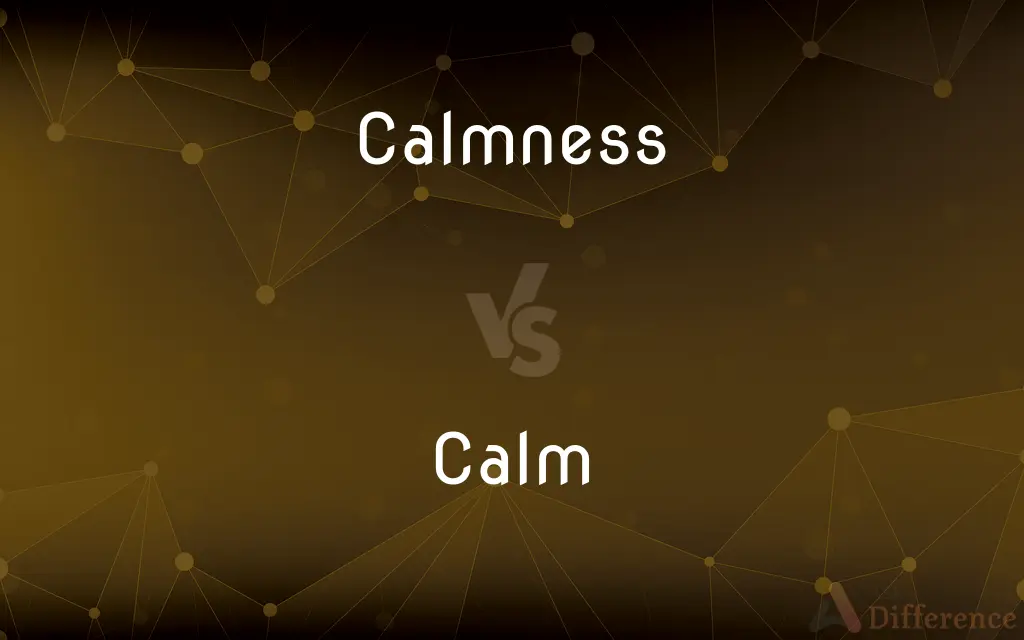Calmness vs. Calm — What's the Difference?
By Tayyaba Rehman — Updated on November 7, 2023
Calmness is a noun describing a state of peace and tranquility, while calm can be a noun, adjective, or verb related to a serene and undisturbed state.

Difference Between Calmness and Calm
Table of Contents
ADVERTISEMENT
Key Differences
Calmness refers to a quality or state of being tranquil and free from agitation or strong emotion. It is a noun and is often used to describe an environment or person that maintains a state of serenity. On the other hand, calm can serve as a noun, adjective, or verb. As a noun, it denotes a peaceful state similar to calmness. As an adjective, it describes a person, place, or situation that is peaceful and undisturbed. As a verb, it signifies the act of making something tranquil or remaining peaceful.
When discussing calmness, one might be referring to the sustained quality of tranquility over a period of time or within a certain context. This term is typically used to reflect an enduring inner peace. In contrast, when one uses calm as an adjective, it might describe a temporary state or a surface-level tranquility. As a verb, calm implies the action of reaching such a state, like calming one's mind after a stressful event.
Calmness can also imply a sense of composure and control, particularly in a situation where chaos or stress could easily take over. It can be considered an attribute of a person's character or a consistent atmosphere in a particular setting. Calm as a noun or adjective can similarly convey this sense of composure, but as a verb, it also encompasses the process of achieving such a state.
Calmness often signifies a deep-rooted sense of peace that permeates one’s being or environment, suggesting a pervasive and sustained quality. Calm, when used as a verb, represents an active pursuit or return to that state of peace, suggesting a dynamic process. As an adjective, it can describe something inherently peaceful or undisturbed, such as a calm sea.
Lastly, calmness can be seen as an abstract concept, a quality one might strive to embody or maintain. Calm, due to its flexibility in part of speech, can be more context-dependent, potentially describing a fleeting moment of tranquility or the ongoing endeavor to maintain that tranquility.
ADVERTISEMENT
Comparison Chart
Part of Speech
Noun
Noun, adjective, verb
Duration
Suggests a lasting state
Can indicate temporary or lasting tranquility
Usage in a Sentence
Often used to describe a quality or state
Used to describe a state, quality, or the action of achieving tranquility
Emotional Depth
Implies depth and endurance of tranquility
Can be surface-level or deep; depends on context
Aspect of Change
Implies stability
Can imply change (especially as a verb)
Compare with Definitions
Calmness
The state of being free of agitation or disturbance
The calmness of the secluded beach was perfect for meditation.
Calm
To be without motion or sound (adjective)
The lake was calm under the moonlight.
Calmness
A tranquil mental state
His calmness was a result of years of mindfulness practice.
Calm
To make tranquil or quiet (verb)
She calmed the crying child with a lullaby.
Calmness
Serene absence of noise or motion
The calmness of the early morning hours is refreshing.
Calm
Not showing or feeling nervousness, anger, or other strong emotions
She had to keep calm at all costs
His voice was calm
Calmness
Calmness is the mental state of peace of mind being free from agitation, excitement, or disturbance. It also refers being in a state of serenity, tranquillity, or peace.
Calm
(of the weather) pleasantly free from wind
The night was clear and calm
Calmness
Nearly or completely motionless; undisturbed
The calm surface of the lake.
Calm
The absence of strong emotions; calm feelings
His usual calm deserted him
Calmness
Not excited or agitated; composed
The president was calm throughout the global crisis.
Calm
The absence of wind
In the centre of the storm calm prevailed
Calmness
An absence or cessation of motion; stillness.
Calm
Make (someone) tranquil and quiet; soothe
I took him inside and tried to calm him down
Calmness
A condition of no wind or a wind with a speed of less than 1 knot (1.15 miles per hour; 1.9 kilometers per hour), according to the Beaufort scale.
Calm
Nearly or completely motionless; undisturbed
The calm surface of the lake.
Calmness
Tranquility or serenity
"an unaccustomed reticence that I took to be the calm that follows rage" (Jeanne Marie Laskas).
Calm
Not excited or agitated; composed
The president was calm throughout the global crisis.
Calmness
To make or become calm or quiet
A warm bath will calm you. After the storm, the air calmed.
Calm
An absence or cessation of motion; stillness.
Calmness
(uncountable) The state of being calm; tranquillity; silence.
Calm
A condition of no wind or a wind with a speed of less than 1 knot (1.15 miles per hour; 1.9 kilometers per hour), according to the Beaufort scale.
Calmness
(countable) The product of being calm.
Calm
Tranquility or serenity
"an unaccustomed reticence that I took to be the calm that follows rage" (Jeanne Marie Laskas).
Calmness
The state of quality of being calm; quietness; tranquillity; self-repose.
The gentle calmness of the flood.
Hes calmness was the repose of conscious power.
Calm
To make or become calm or quiet
A warm bath will calm you. After the storm, the air calmed.
Calmness
Steadiness of mind under stress;
He accepted their problems with composure and she with equanimity
Calm
(of a person) Peaceful, quiet, especially free from anger and anxiety.
Calmness
An absence of strong winds or rain
Calm
(of a place or situation) Free of noise and disturbance.
Calmness
A feeling of calm; an absence of agitation or excitement
Calm
(of water) with few or no waves on the surface; not rippled.
Calmness
Steadiness of mind under stress
Her calmness in the face of danger was admirable.
Calm
Without wind or storm.
Calmness
Even-tempered disposition
She handled the negotiations with calmness, despite the tension.
Calm
(in a person) The state of being calm; peacefulness; absence of worry, anger, fear or other strong negative emotion.
Calm
(in a place or situation) The state of being calm; absence of noise and disturbance.
Calm
A period of time without wind.
Calm
(transitive) To make calm.
To calm a crying baby
To calm the passions
Calm
(intransitive) To become calm.
Calm
Freedom from motion, agitation, or disturbance; a cessation or absence of that which causes motion or disturbance, as of winds or waves; tranquility; stillness; quiet; serenity.
The wind ceased, and there was a great calm.
A calm before a storm is commonly a peace of a man's own making.
Calm
To make calm; to render still or quiet, as elements; as, to calm the winds.
To calm the tempest raised by Eolus.
Calm
To deliver from agitation or excitement; to still or soothe, as the mind or passions.
Passions which seem somewhat calmed.
Calm
Not stormy; without motion, as of winds or waves; still; quiet; serene; undisturbed.
Now all is calm, and fresh, and still.
Calm
Undisturbed by passion or emotion; not agitated or excited; tranquil; quiet in act or speech.
Such calm old age as conscience pureAnd self-commanding hearts ensure.
Calm
Steadiness of mind under stress;
He accepted their problems with composure and she with equanimity
Calm
Make calm or still;
Quiet the dragons of worry and fear
Calm
Make steady;
Steady yourself
Calm
Become quiet or calm, especially after a state of agitation;
After the fight both men need to cool off.
It took a while after the baby was born for things to settle down again.
Calm
Cause to be calm or quiet as by administering a sedative to;
The patient must be sedated before the operation
Calm
Not agitated; without losing self-possession;
Spoke in a calm voice
Remained calm throughout the uproar
Calm
Characterized by absence of emotional agitation;
Calm acceptance of the inevitable
Remained serene in the midst of turbulence
A serene expression on her face
She became more tranquil
Tranquil life in the country
Calm
(of weather) free from storm or wind;
Calm seas
Calm
Marked by freedom from agitation or excitement;
The rioters gradually became calm and slowly dispersed
Calm
Peaceful and undisturbed state (noun)
The calm of the deserted streets was eerie.
Calm
Free from excitement or passion (adjective)
Her calm response diffused the argument.
Calm
Not showing or feeling nervousness (adjective)
His calm demeanor in the courtroom impressed the jury.
Common Curiosities
Is calm ever used as an adjective?
Yes, calm can describe a person or situation that is free of agitation.
Does the term calmness imply a permanent state?
Not necessarily permanent, but it does suggest a more lasting or inherent quality.
What is the primary difference between calmness and calm?
Calmness is a noun indicating a state of peace, while calm can be a noun, adjective, or verb relating to serenity or the act of becoming serene.
Is calmness a physical or mental state?
It is primarily a mental state, but can also describe a physical environment.
Is it correct to say ‘calm down your calmness’?
No, that phrase is redundant and not grammatically correct.
Can calmness be used as a verb?
No, calmness is solely a noun.
Can calmness and calm be used interchangeably?
As nouns, they are often interchangeable, but not as other parts of speech.
How does one achieve calmness?
Through practices like meditation, deep breathing, or situations of little to no stress.
Can calm be a command?
Yes, as in "Calm down!" when instructing someone to relax.
What does it mean to calm someone?
It means to soothe or make them less agitated.
Can calm be a state of the environment?
Yes, calm can describe an environment that is peaceful and undisturbed.
Does the word calmness have any synonyms?
Yes, tranquility, serenity, and peace are synonyms.
How do you use calmness in a sentence?
"The teacher's calmness kept the classroom in order."
Can objects possess calmness?
Not literally, but they can contribute to an atmosphere of calmness.
What is the opposite of calmness?
Agitation, unrest, or turmoil can be considered opposites.
Share Your Discovery

Previous Comparison
Bandana vs. Neckerchief
Next Comparison
Enquiry vs. QueryAuthor Spotlight
Written by
Tayyaba RehmanTayyaba Rehman is a distinguished writer, currently serving as a primary contributor to askdifference.com. As a researcher in semantics and etymology, Tayyaba's passion for the complexity of languages and their distinctions has found a perfect home on the platform. Tayyaba delves into the intricacies of language, distinguishing between commonly confused words and phrases, thereby providing clarity for readers worldwide.














































